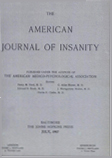Abstract
1. Heredity, as recorded in the 3553 school clinic examinations, reveals that feeble-mindedness is present in one or both parents in approximately 7 per cent of cases, mental disease in approximately 3 per cent of the cases, and epilepsy in 1 per cent of the cases. The comparison in heredity made with cases in the Wrentham State School, seems to indicate that the inheritance of mental defect is more obvious in institution cases than in school clinic cases.
2. Approximately 72 per cent of the children examined were feeble-minded.
3. Sixty per cent of the children examined were unsuccessful in their attempts to pass the first grade in school.
4. There is little difference in the order of birth of these retarded children and children in the general population.
5. Physical defects were very common. In fact, there were but 26 children out of the total of 3553 who were without physical defect. Four children out of five had defective teeth or tonsils. One retarded child out of four had defective vision or hearing, one out of six had a defective heart or defective circulation. One out of seven had a nervous disease or disorder. One out of seven had a disorder of the bones.
6. Height and weight revealed but little variation from accepted averages in the general child population.
7. Four hundred and fifty-eight cases having two examinations at a mean interval of one and one-half years, show an increase in the mean mental age from seven years to eight years. During this period, the mean intelligence quotient decreased from .76 to .73. There were intelligence quotients which increased, but there were more showing a tendency to decrease, and consequently the mean of the second examination was depressed three points. Whether this decrease is significant or not is not yet settled, because of insufficient numbers.
This study of mental deficiency is the first project under the new plan of organized research into the problems of mental disease and mental defect, which is being developed by the Massachusetts Department of Mental Diseases. When the entire investigation has been finished and a detailed study made of the completed material, conclusions will be in order. At this time, however, they would be premature.
We can say that our present results suggest that there is a great deal of "legend" in much of the commonly accepted thought on feeble-mindedness. We have learned that there is much work to be done in studying extra-institutional cases before we can have a complete picture of mental deficiency.
I wish to express my thanks to Dr. Henry B. Elkind, Director of the Massachusetts Society for Mental Hygiene, for his assistance in the preparation of the code and for his valued advice. Dr. Ransom A. Greene, Superintendent of the Walter E. Fernald State School, and Dr. George L. Wallace, Superintendent of the Wrentham State School, also receive my thanks for their suggestions and cooperation in rendering available the material of their travelling school clinics.

